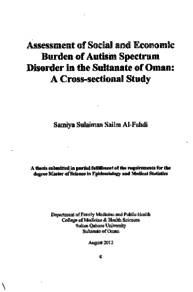وثيقة
Assessment of social and economic burden of autism spectrum disorder in the Sultanate of Oman: a cross-sectional study.
الناشر
Sultan Qaboos University
ميلادي
2012
اللغة
الأنجليزية
الملخص الإنجليزي
Background: While recognized that Autism Spectrum Disorder (ASD) as global public health challenge, there is scarcity of information demonstrating whether variation in socioeconomic status (SES) has direct effect on perceived constraint of caring for ASD children in the Arab world.
Aim: To investigate whether caregivers' variations in SES has direct effect on perceived challenge arising from nurturing children with ASD.
Methods: A cross-sectional study was nested on an ongoing research project among the caregivers of children with ASD who are registered at the Autism Database at Sultan Qaboos University (SQU). Questionnaires were adopted from the available literature.
The modified questionnaire elicited in what has been operationalized as perceived indices remedial and rehabilitation, utilization and perception of psychiatric services, problems faced for being caregiver with children with ASD and expenses of taking care of children with ASD.
Results: Out of 150 ASD families surveyed, low-income families constituted 47% (n = 70), middle income was 33% (n=50), and the rest were those defined as wealthy families. The data suggest that commanding higher income is no guarantee for being satisfied with coping with all what is entailed to caring for children with ASD. On the other hand, presence of such children reduces on supply for required quality of life. The situation is further compounded with lack of organized remedial and rehabilitation and social services for children with ASD.
Conclusion: The burden for caregiver of children with ASD is considerably high noted on this particular Arab/Islamic population. The situation is comparable with situations in other parts of the world. With wide recognition that children with ASD tend to create slight but exhausting social and economic complication, an initiative that is global on its outlook would be essential. Factors to ease such conditions are therefore vital in order to improve the quality of life of ASD families.
المجموعة
URL المصدر
الملخص العربي
يعتبر مرض طيف التوحد تحديا يواجه الصحة العالمية العامة, وعلى الرغم من هذا التهديد فإن هناك ندرة في المعلومات التي توضح ما اذا كان تفاوت الأوضاع الاجتماعية الاقتصادية له تأثير مباشر على رعاية الأطفال الذين يعانون من مرض طيف التوحد في ظل هذه العوائق. الهدف: تهدف هذه الدراسة إلى التحقق من أن تفاوت الأوضاع الإجتماعية الاقتصادية لمقدمي الرعاية لأطفال التوحد له تأثير مباشر على التحديات الناشئة اثر رعاية أطفال طيف التوحد. الطريقة: تم اجراء دراسة مستعرضة على مشروع بحثي مستمر بين مقدمي الرعاية لأطفال التوحد المسجلين ضمن قاعدة بيانات التوحد في جامعة السلطان قابوس, كما تم اعتماد الاستبيانات من الدراسات المنشورة سابقا. وتم النظر في مؤشرات تفعيل إعادة التأهيل والعلاج, و تصور استخدام خدمات الطب النفسي، والتحديات الناشئة إثر رعاية أطفال اضطراب طيف التوحد, ونفقات رعايتهم من خلال الاستبيان المعدل. النتائج: من بين 150 أسرة تعاني اضطراب طيف التوحد شملتها الدراسة, تشكل الأسر ذات الدخل المنخفض % 47 (وعددهم 70) و33%( وعددهم 50) من الأسر المتوسطة الدخل, والأسر المتبقية الأخرى تعد أسرة ثرية. وتشير البيانات إلى أن اسر الدخل المرتفع غير راضية بمستوى الرعاية المقدمة لأطفال طيف التوحد مما يؤدي إلى تقليل الجودة المطلوبة لحياة أطفال التوحد. كما أن عدم وجود خدمات منظمة اجتماعية و علاحية تأهيلية میں امر بالمعدل لهؤلاء الأطفال يزيد من حدة الوضع. الاستنتاج: يعتبر عبء رعاية الأطفال الذين يعانون من اضطراب طيف التوحد عاليا" الى حد كبير بين سكان العرب والمسلمين عند مقارنتهم مع السكان في أجزاء أخرى من العالم. وتتضاعف الاحتياجات الإجتماعية والاقتصادية لهؤلاء الأطفال. و لذا فالمبادرة ضرورية لتخفيف مثل هذه الظروف من أجل تحسين حياة أسرة.
قالب العنصر
الرسائل والأطروحات الجامعية

